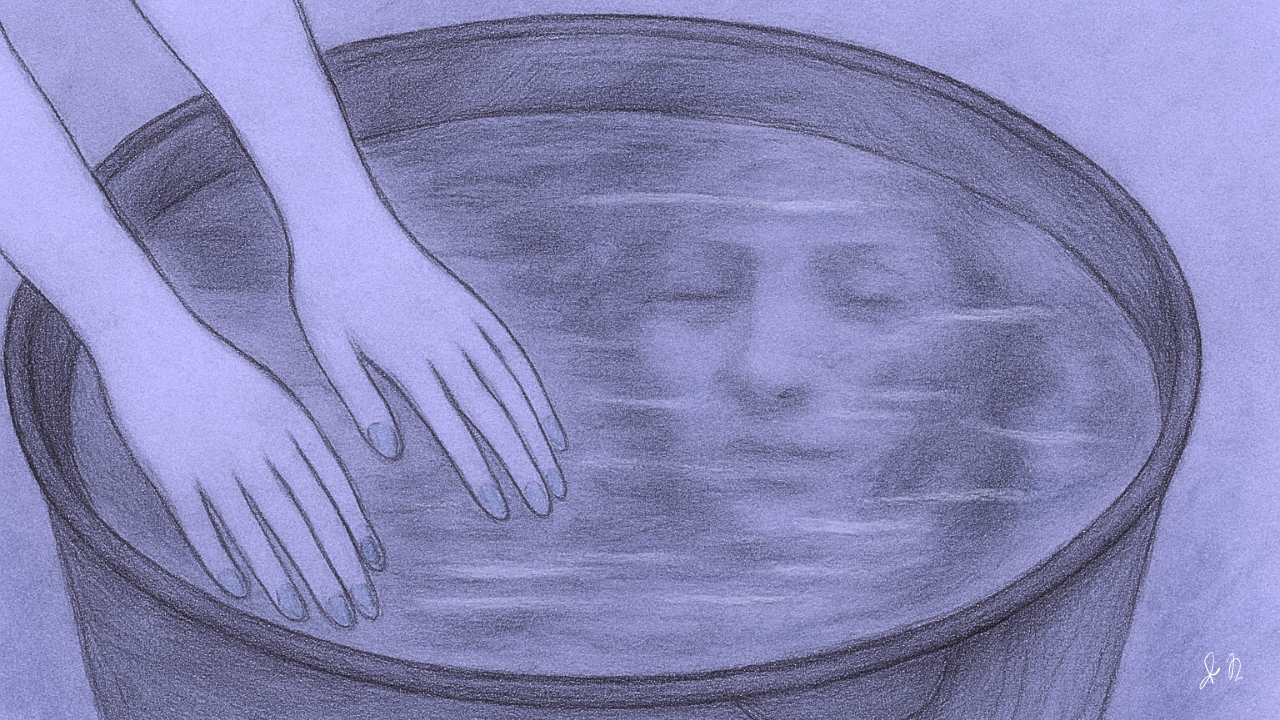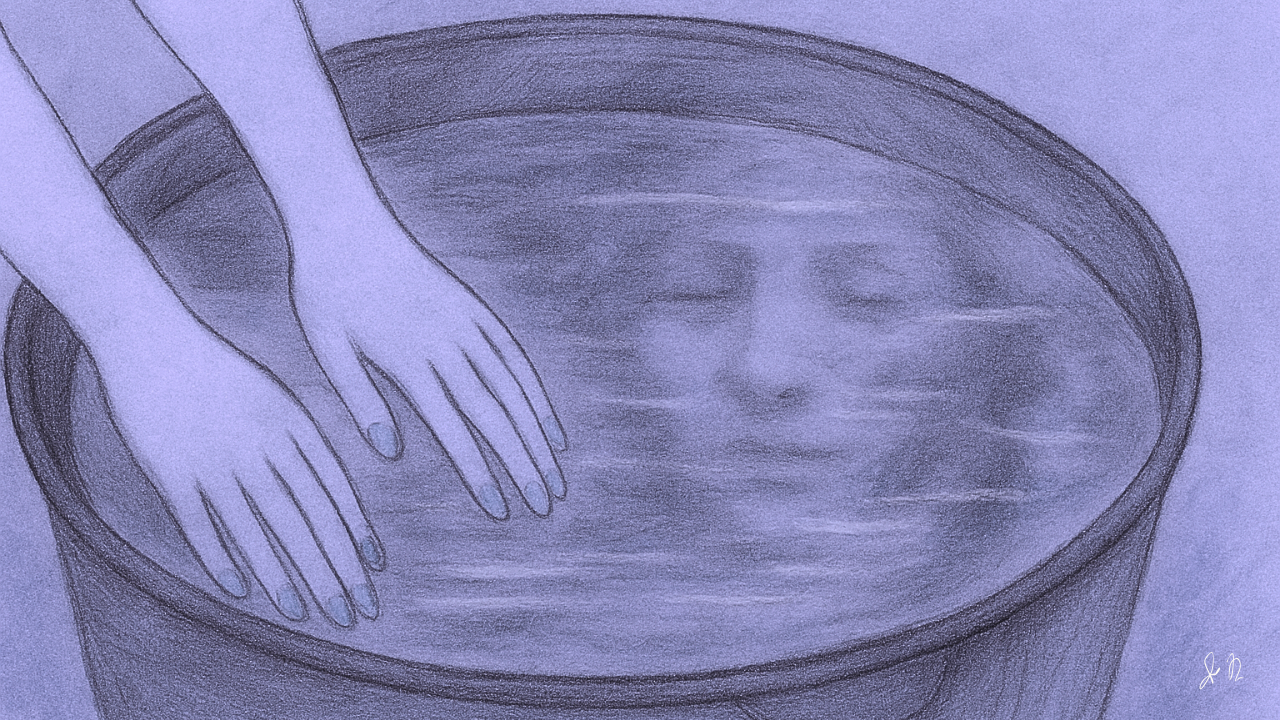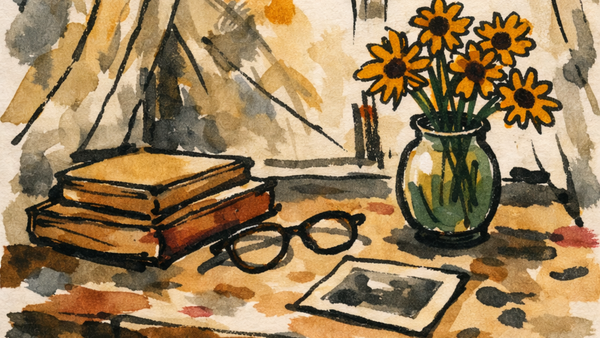Housekeeping for the Dead
Seven rooms. Seven deaths. I have to clean up all of them.


Content warning: this story deals with terminal illness, death, and complicated grief. It is honest about the guilt and anger that can come with watching someone you love die slowly, and it doesn't offer easy comfort or resolution. So if you're dealing with a situation like this in your own life, you may want to skip this week's story.
The Starlight Motel has twelve rooms but I only clean seven. The other five stay locked. Nobody ever asks why.
I start at eleven. The rain steams against the hot asphalt and the vending machine won’t stop humming no matter how many times I kick it. My cart has wheels that don’t turn right. I’ve learned to push it sideways.
Room 3 first. Always Room 3.
The key sticks, so my wrist torques wrong and I feel it in my elbow. Inside smells like a perfume I can’t remember the name of. White Shoulder? I just know it comes in a frosted bottle shaped like a woman with no head. I also remember my mother wore it to my eighth-grade graduation and the smell made me sneeze through the whole ceremony. I remember that, but I don’t remember the name of the perfume.
Inside Room 3, the woman in the bed is asleep or pretending. Thin hair spread on the pillow, rusty at the roots. One arm outside the covers, bruised green-yellow at the crook. IV marks. Her chest rises slow. I start with the bathroom. Someone threw up in the sink. Not much, just a little pink splash, toothpaste-bright. I wipe it with the blue towel that says STARLIGHT in thread so old it’s gone gray.
When I come out she’s sitting up, looking at me.
She has my mother’s mole next to her left eye. She has my mother’s mouth, the way the bottom lip is fuller than the top. She has my mother’s hands, knuckles big from arthritis she never got treated because doctors cost money.
“You don’t have to,” she says. Her voice is smoke and gravel. “The room’s fine.”
I say nothing and strip the bed while she sits in the chair by the window. The sheets are damp. They have that sour-sweet smell that gets into everything. I fold them into the cart, not looking at the rust-colored bloom on the pillowcase.
“I had a daughter,” she says.
I put on the new sheets. Hospital corners. Pull them tight.
“She used to clean my apartment when I got too tired. I’d tell her not to bother but she’d do it anyway. Vacuum. Dishes. She’d get mad at me for leaving soup cans on the counter.”
My mother left soup cans everywhere. Campbell’s chicken noodle. She’d eat it cold from the can, standing at the counter, and leave the empty next to the sink where it would leak orange brine onto the Formica.
“She sounds nice,” I say, my voice hoarse.
“She stopped visiting.”
I tuck the blanket in. “Maybe she got busy.”
“Oh, well, maybe I got mean.” The woman coughs, wet and thick. “People get mean when they’re dying. Did you know that?”
I knew that.
She’s quiet while I finish. When I look up she’s not breathing anymore. Just stopped, between one moment and the next, like a light switching off. Her head tilted toward the window. The parking lot lights make her face orange. I remake the bed with her in it. Tuck the blanket up to her chin. She fades before I finish, going gray and then transparent and then just gone, but I pull the blanket smooth anyway.
The perfume smell stays.
Room 4 has a low hum. Or maybe it’s just in my ears. The woman’s in the chair with an oxygen tank, the tubes in her nose, watching a rerun of some game show with the sound off. Her hair is long, pulled back in a scrunchie. Pink velour scrunchie. My mother had one exactly like it that she wore until the elastic died and it became just a tube of fabric.
“Oh,” she says when she sees me. “I thought checkout was eleven.”
“It is.”
“Then why are you cleaning?”
I don’t know how to answer that. I start with the trash can. It’s empty except for a tissue with lipstick on it, orange-pink, the color my mother wore to make herself feel like she’d tried.
“Need anything?” I ask.
She looks at me for a long time. The oxygen machine clicks and hisses. On TV, someone wins a car and their mouth opens in a silent scream.
“I need a cigarette,” she says. “But I’ve got this thing.” She taps the tube. “Can’t smoke within fifty feet of oxygen tanks. Did you know that? You’ll blow yourself up.”
“I didn’t know that.”
“Well, now you do.” She shifts in the chair. “There’s a lighter in my purse. Red Bic. You could smoke for me. Stand where I can see you through the window. I could watch.”
The purse is on the floor by the bed. Inside: a wallet with a 20, a lipstick worn to a nub, two pennies, a CVS receipt from 2019, and a red lighter. I go outside. The rain has stopped but everything is still wet. The parking lot reflects the neon sign, pink and blue, the words VACANCY and NO blurred together. I light a cigarette I don’t have, mime inhaling, blow pretend smoke into the night. Through the window, I can see her watching. She’s smiling. I think.
When I go back in she’s dead. Slumped in the chair, tubes still in her nose, oxygen machine still clicking away like it doesn’t know there’s no point anymore. I reach over and switch it off. The silence is sudden and huge. I should call someone. The manager. An ambulance. Someone whose job is dealing with bodies. Instead I finish cleaning. Wipe the nightstand. Straighten the magazines. Fold the towels she never used.
She doesn’t fade like the first one. She stays solid, slumped and still, and I leave her there when I go.
Room 5 the door is already open. She’s on the floor between the bed and the bathroom. One side of her face slack, mouth pulled down like melted wax. She’s trying to say something but the sounds don’t match up with her lips. Her hand scrabbles at the carpet.
I kneel down. “What do you need?”
Her good eye focuses on me. The bad one wanders. She makes a sound like “buh” or “nuh” or maybe just air escaping.
“Phone? You want the phone?”
She shakes her head, or tries to. The motion is small and wrong.
“Water?”
No.
“Should I call someone?”
Her hand grabs my wrist. Her grip is weak but desperate, fingers digging into the bone. She pulls me close. Her breath smells sour and sweet.
“Duh,” she says. “Duhhh. Duh-duh-duh.”
“I don’t understand.”
She starts crying, tears running down the good side of her face, the bad side just wet. Her hand squeezes tighter. I can feel her pulse in her fingertips, fast and fluttery like a bird dying in your hands.
I stay with her until it stops. Her hand goes…slack. Her eye…closes. The crying stops but the tears are still on her face, running down into her hair. I clean around her. Scrub the bathroom. Change the sheets. Vacuum the carpet right up to her body, the vacuum bumping against her hip, her shoulder, her outstretched hand. When I’m done she’s gone. Just the dent in the carpet where she was, and the smell of industrial cleaning solution.
Room 6 has pill bottles on the nightstand. Orange bottles, white bottles, one brown glass bottle with no label. They’re arranged in a circle around a glass of water that’s gone cloudy with dust. She’s in the bed, under the covers, curled on her side. Asleep or dead, I can’t tell. I start cleaning and wait to find out.
The bathroom mirror has lipstick writing: SORRY in orange-pink, shaky letters, some of them running where the lipstick got too warm. I wipe it off. The lipstick smears, turns the whole mirror orange before the Windex cuts through.
When I come out she’s watching me.
“I thought I’d feel different,” she says.
“About what?”
She shifts under the covers. “I thought it would be like falling asleep. Peaceful. But I just feel tired.”
“Maybe you’re not done yet.”
“Oh, I’m done.” She laughs with a bitter edge in her throat. “I’ve been done for years. I just kept going anyway.”
I strip the other bed, the one she didn’t sleep in. The sheets are still clean but I change them anyway because that’s the job.
“My daughter thinks I’m a coward,” she says.
“For what?”
She gestures at the pill bottles. “She wanted me to fight. I just wanted to stop being tired.”
My mother said the same thing to me once, near the end. I told her she was being ridiculous. I told her she had to try. I made her appointments and drove her to them and sat in waiting rooms reading magazines from 2003 while she got poison pumped into her veins.
She died anyway.
“Your daughter probably just didn’t want to lose you,” I say.
“Well, she did.” She closes her eyes. “Tell her I’m sorry. Tell her it wasn’t about her.”
“I’m not going to see your daughter.”
“Thank you,” she says, and then she’s gone, just a shape under the covers that collapses into nothing, and the pill bottles are empty, and the glass of water is clean.
Room 7 I don’t go into. I can hear glass breaking from outside. And a scream. The door shakes in its frame. I stand there with my hand on the key and I don’t turn it. I move on.
Room 8 smells like lilacs even though lilacs don’t bloom in October. She’s in the bed, on top of the covers, wearing the blue dress she wore to my high school graduation. Her hands are folded on her stomach. Her eyes are closed. She looks like someone who fell asleep reading and forgot to turn off the light. I know she’s dead before I touch her. I know because she looks peaceful and my mother never looked peaceful. Even sleeping she looked like she was working something out, eyebrows pulled together, mouth tight. I sit on the other bed. I should clean but I don’t. I just sit there looking at her.
“You know what the worst part was?” I say to the body. “You kept acting like dying was something you were doing to me.”
No answer.
“I’m so angry at you. I can’t speak to you.”
The air conditioning kicks on. Cold air hushes away the mildew and strengthens the lilacs.
“I miss you so much I can’t speak to you.”
She fades while I’m talking. Just goes transparent and then not there, and the bed is empty. I strip the bed anyway. Fold the sheets. Put on new ones even though nobody’s going to sleep here.
Room 9 the light is on but nobody’s inside. The bed is made. The towels are folded. It’s the cleanest room I’ve seen all night.
On the nightstand there’s a note in handwriting I recognize: THANK YOU FOR CLEANING UP AFTER ME. I’M SORRY IT WAS ALWAYS SO MUCH WORK.
I pick it up. The paper is motel stationery, STARLIGHT across the top in faded gold letters. The pen she used bled through to the other side. I sit on the bed and read it again. And again. And again until the words stop meaning anything, until they’re just shapes, just ink.
The note doesn’t fade. I fold it in half and put it in my pocket. I clean the room anyway. Because that’s what I came here to do.
My shift ends at six. The sky goes from black to gray to thin blue. I push my cart to the supply closet. Put the dirty towels in the hamper. Restock for tomorrow. The manager’s office is dark. I leave my timecard on the desk, filled out in pencil: 11:00 PM to 6:00 AM, seven rooms, nothing unusual.
Outside, the parking lot is empty except for my car and a shopping cart someone abandoned by the dumpster. The motel sign buzzes. NO VACANCY, even though all twelve rooms are empty. I get in my car. The engine turns over on the second try. I should get that looked at.
In my pocket, the note crinkles.
I drive home on roads that are still wet, the tires hissing. The radio plays a gentle folk song I don’t listen to. My apartment is fifteen minutes away but it feels like hours. When I get home I’ll sleep. When I wake up I’ll eat something. When it gets dark I’ll come back to the Starlight and I’ll clean Rooms 3 through 9 again. The note in my pocket says THANK YOU. It doesn’t say STOP. So I won’t.
Author's Notes:
My mom was sick a lot when I was a kid. In and out of hospitals. And I had this dream that kept coming back where I'm cleaning rooms and she's in every single one of them. Different versions of her, all dying or already dead. I'd wake up exhausted, like I'd actually been working all night.
Eventually, my mom got a lot better. But I didn't understand those dreams for a long time (mainly because I was, you know, a child). I thought my brain was just torturing me. But while writing this story, I realized that in the dreams, I had something to do. A little agency, if you will. I had a cart and supplies and a list of rooms. In real life, I was just an unsupervised kid sitting in waiting rooms feeling totally useless. At least in the dreams I could fold sheets and wipe mirrors and make things clean the way my mom would, even if I couldn't make anything better for her in real life.
The line in Room 8—"you kept acting like dying was something you were doing to me"—that one was hard. Because I really felt that way sometimes and I still feel guilty about it. She was the one who was sick and I was mad at her for it. How messed up is that? But I think maybe that's just what happens when you watch someone fade slowly. You love them and you're losing them and somehow that turns into anger, and then you feel like a monster for being angry.
I don't even know what the five locked rooms are. Parts of this I'm still not ready to deal with, maybe. The story doesn't want me to open them yet, so they stay locked.
Overall, this story came out of something really dark that I've been carrying around since I was maybe ten years old. I needed to write it. I needed to clean those rooms, at least on paper. It doesn't fix anything but it helps. A little.
Jon Negroni is a Puerto Rican author based in the San Francisco Bay Area. He’s published two books, as well as short stories for IHRAM Press, The Fairy Tale Magazine, and more.
Support Cetera
Paid members get exclusive perks like bonus stories, the ability to comment, and more. Plus you'd be helping us keep the bills paid. You can check out the subscription tiers below, or you can leave a one-time tip if that works better for you.





